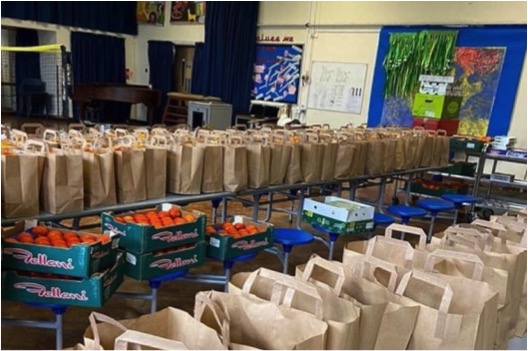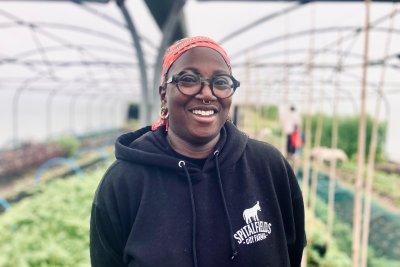 Credit: HC3S / Hampshire County Council
Credit: HC3S / Hampshire County Council

Rebuilding a 'new normal' for school food
As the government starts to lay out phased return of children to school over coming months, Jeanette Orrey, co-founder of Food for Life and co-chair of the School Food Plan Alliance, and Myles Bremner, former director of the School Food Plan, discuss the challenges facing school catering operations.
It’s clear that life won’t be the same as before. But what does the ‘new normal’ look like for the future of our school meals service? How can caterers survive current mammoth challenges? And could doing things differently in the future address some of the school food systemic challenges around financial viability, children’s health and wellbeing, as well as tackling inequalities?
The last month has seen many schools, caterers and volunteers come together to make sure that some of our most vulnerable children are able to continue to get that ever so important free school meal – continuing to provide hot lunches for those still in school, packed food parcels for delivery or collection. They’ve been grappling with challenges caused with the roll-out of the national voucher scheme operated by EdenRed. LACA has led the way so that caterers can get clarity on Cabinet Office’s procurement advice (PPN 02/20); schools have an obligation to pass on public funds to maintain the sector as much as possible.
Schools are an important marker for post lockdown life. Pupils may not be at such personal significant risk from the disease, but they may well be carriers. Teaching unions are voicing loud concerns on how to protect the school workforce. How will densely populated schools deal with social distancing? How will they deal with mass, swirling, congregations at breaks and lunchtimes?
Solutions will require changes to previous norms
Solutions will be found of course - whether it’s a staggered year group return, one week in, one week out of schooling, smaller classroom sizes or reduced school hours. But there will undoubtedly be significant changes for our school kitchens and dining rooms – though we know the school meals workforce has always risen to the many challenges it has faced. Will the kitchen teams be able to work in the kitchens together? What will a socially distanced queue look like? The serving line? Seating? Water jugs on the tables? Continuation of a communal salad bar? Family dining? The progress made by schools and caterers over recent years to deliver a more civilised and interactive dining experience jars against the need for a protective COVID-proof eating environment.
Making the economics work
The economics of school food will continue to be sorely tested. Even if pupils are at school, we don’t know whether parents will exercise extra safety control by providing their children a packed lunch. Whatever way, the School Food Plan proved that low take-up can’t sustain a viable school meals service and an adapted dining room and service might also massively extend the lunch hour, bringing school disruption and extra costs for staff and midday supervisors.
Simplifying a healthy, nutritious food offer
Might this be a time to look at simplifying as well as adapting? In recent years, secondary and many primary schools have expanded their school lunch offer – presenting an array of choices each day. At secondary schools this often means multiple purchase opportunities throughout the school day, with high fat, sugar and salt options a popular choice. Adaptation to a single dining offer for both primary and secondary schools (taking into account vegetarian and special diets of course) might deliver a number of potential benefits.
A single dining offer could simplify kitchen production, supporting a safer workplace environment for staff. Second, it could make serving and dining easier and quicker. Schools in Wuhan have reconfigured their canteens with individual serving stations and eating bays. In Japan, meals are delivered to and then eaten in classrooms (this happens in some smaller English schools too). There is no reason why a hot meal can’t be boxed up in sustainable packaging and taken as a ‘grab and go’.
Integrating supply chains and small producers
Caterers could potentially benefit from procurement efficiencies. A reduced supply chain and more bulk buying might reduce numbers of deliveries from suppliers (reducing supplier/customer contact) as well as creating economy of scale savings. And what about embracing those smaller producers, many of which have been keeping rural schools going?
With so many connotations in schools small, medium and large, each individual school will have to look very carefully at what type of service will work best. Now is the time for head teachers and school caterers to come together to work out the best way to keep our children safe and feed them well.
Finally, serving hot nutritious daily meals to pupils would mean that parents, schools and their caterers would have more faith knowing that children are getting the food that they need.
For more information:
Check out the School Food Plan Alliance Checklist for caterers and school leaders, designed to support you in ensuring children can safely access good, nutritious school food.
Read more about Sustain's response on school meals and feeding vulnerable children during the Coronavirus here
Children's Food Campaign: Campaigning for policy changes so that all children can easily eat sustainable and healthy food.
Sustain
The Green House
244-254 Cambridge Heath Road
London E2 9DA
020 3559 6777
sustain@sustainweb.org
Sustain advocates food and agriculture policies and practices that enhance the health and welfare of people and animals, improve the working and living environment, promote equity and enrich society and culture.
© Sustain 2025
Registered charity (no. 1018643)
Data privacy & cookies
Icons by Icons8







